📞+86 153 7530 2641 📧 hongjing.Wang@feichuncables.com
Type M(StD)HOEU Flat Festoon Cable | High-Flex Oil & Chemical Resistant Crane Control Cable(AS/NZS 3191)
Type M(StD)HOEU Flat Festoon Cable delivers exceptional flexibility and durability for hoisting gears and transport systems. Featuring copper conductors, rubber insulation, polychloroprene sheath, and UL Style 4540/DIN VDE 0250-809 certification, it resists oils, fats, chemicals, and extreme temperatures (–40°C to +80°C), ensuring reliable performance in harsh industrial environments.
hongjing.Wang@Feichun
7/14/20259 min read

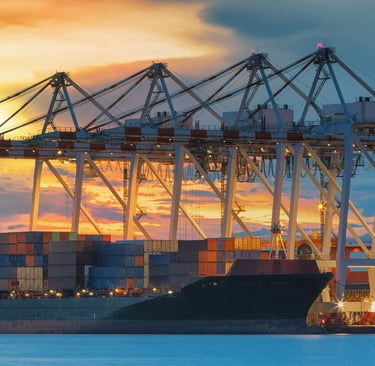
Introduction
In Australia's demanding industrial landscape, from mining operations in the Pilbara to port facilities in Sydney and Melbourne, the reliability of crane control systems is absolutely critical. The heart of these systems lies in their festoon cables – the unsung heroes that ensure continuous power and signal transmission across moving machinery. When equipment downtime can cost thousands of dollars per hour, having the right festoon cable becomes not just important, but essential for maintaining operational efficiency.
Type M(StD)HOEU flat festoon crane cable represents a pinnacle of engineering excellence, specifically designed to meet the rigorous demands of Australian industrial applications. Whether you're managing container cranes at Fremantle Port or operating overhead cranes in a manufacturing facility, this high-flex oil-resistant festoon cable provides the durability and performance characteristics that Australian operators demand.
The unique challenges faced by Australian industries – from extreme temperature variations to exposure to harsh chemicals and oils – require specialised cable solutions. Standard cables simply won't cut it when your operation depends on continuous, reliable power transmission across moving bridge cranes, gantry cranes, and automated material handling systems.
Model & Certification
The Type M(StD)HOEU Flat Festoon Cable stands as a testament to German engineering precision, meeting the stringent requirements of European, North American, and Australian/New Zealand standards. This chemical-resistant control cable for hoisting gear carries triple certification under DIN VDE 0250-809, UL Style 4540, and AS/NZS 3191, ensuring it meets the highest international safety and performance standards.
DIN VDE 0250-809 certification guarantees that this cable complies with German engineering standards for power installation cables, particularly those designed for flexible applications. The AS/NZS 3191 compliance ensures the cable meets Australian and New Zealand standards for electrical installations, providing local regulatory confidence for Australian operators who need assurance that their cable investment will perform reliably in demanding industrial environments.
The UL Style 4540 cable certification adds another layer of confidence, meeting North American safety standards that are increasingly recognised in global industrial applications. This triple certification approach means that whether you're working with European-designed cranes, American-manufactured equipment, or systems designed to Australian standards, the Type M(StD)HOEU cable will integrate seamlessly into your existing systems while meeting local regulatory requirements.
This comprehensive certification framework, including AS/NZS 3191 compliance, ensures that Australian operators can confidently specify this cable for critical applications, knowing it has undergone rigorous testing for electrical performance, fire resistance, and mechanical durability while meeting local regulatory requirements. The certifications also streamline the approval process for projects that require compliance with Australian electrical installation standards and international safety requirements.
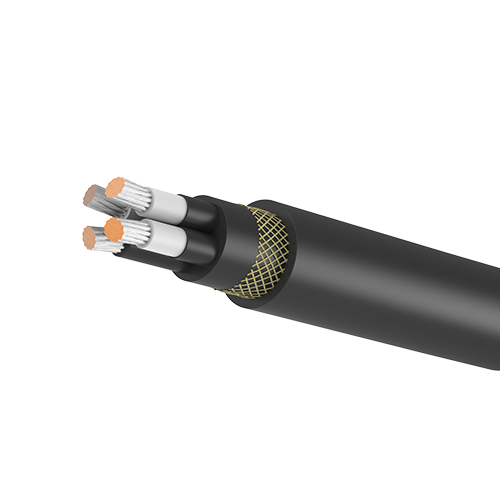

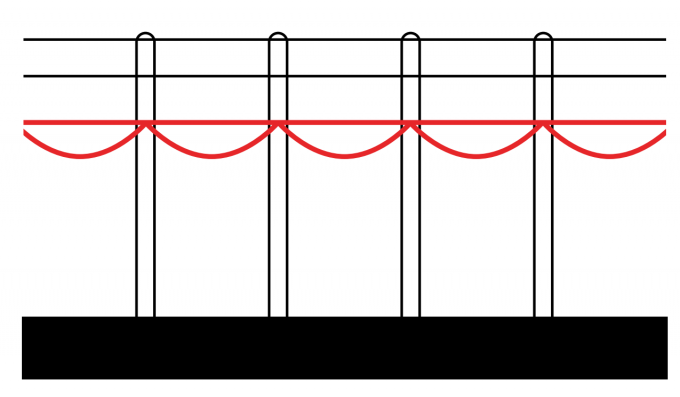

Structural Features
At the core of every Type M(StD)HOEU cable lies precision-engineered copper conductor construction that sets it apart from standard industrial cables. For conductors up to 25 mm², the cable utilises Class 6 copper construction, providing exceptional flexibility essential for constant movement applications. For larger conductors of 35 mm² and above, Class 5 copper construction delivers the perfect balance of flexibility and current-carrying capacity.
The copper conductors are carefully wrapped with either paper tape or PETP film, depending on the specific application requirements. This wrapping serves multiple purposes: it provides additional insulation protection, reduces the risk of conductor damage during flexing, and helps maintain the cable's structural integrity over millions of flex cycles.
The flat profile design of this DIN VDE 0250-809 polychloroprene festoon cable offers significant advantages over traditional round cables. The flat configuration reduces the overall height of festoon systems, allowing for more compact installation in space-constrained environments. This design also provides superior heat dissipation, ensuring consistent performance even under heavy load conditions.
Each conductor is individually processed to ensure optimal flexibility characteristics. The stranding pattern and wire diameter are carefully calculated to provide maximum fatigue resistance while maintaining excellent electrical conductivity. This attention to detail in the structural design translates directly into extended service life and reduced maintenance requirements for Australian operators.
Insulation & Sheath Materials
The insulation system of the Type M(StD)HOEU cable represents a carefully engineered solution to the challenges faced in Australian industrial environments. The inner insulation utilises 3GI3 rubber compound, manufactured to DIN VDE 0207-20 specifications, providing exceptional resistance to oils, fats, and a wide range of industrial chemicals commonly encountered in Australian operations.
This specialised rubber insulation maintains its flexibility and dielectric properties even when exposed to hydraulic oils, cutting fluids, and other industrial lubricants that would degrade standard cable insulation. For operations in mining, manufacturing, and marine environments where chemical exposure is inevitable, this resistance characteristic ensures reliable long-term performance.
The outer sheath employs 5GM3 polychloroprene compound, manufactured to DIN VDE 0207-21 standards. This material choice provides outstanding protection against UV radiation – particularly important for Australian outdoor applications where intense sunlight can rapidly degrade inferior cable materials. The polychloroprene sheath also offers excellent resistance to weathering, ozone, and mechanical abrasion.
The combination of these materials creates a 0.6/1 kV flexible festoon cable that can withstand the harsh Australian environment while maintaining its electrical and mechanical properties. The material selection also ensures compatibility with a wide range of industrial chemicals, making it suitable for diverse applications from food processing to petrochemical facilities.
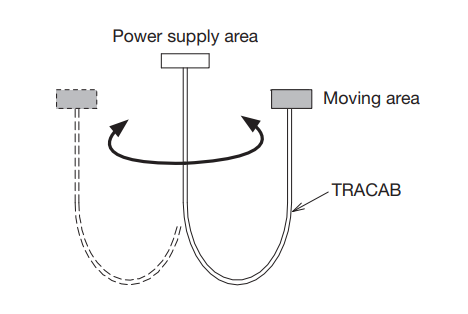

Electrical & Thermal Performance
The electrical performance characteristics of the Type M(StD)HOEU cable are specifically designed to meet the demands of industrial crane and material handling applications. With a rated voltage of 0.6/1 kV, this cable handles the power requirements of most industrial control and power applications, while the AC test voltage of 2.5 kV provides a significant safety margin for reliable operation.
Operating temperature performance is a critical consideration for Australian applications, where ambient temperatures can vary dramatically. The cable maintains full performance across an impressive temperature range of –40°C to +80°C for fixed installations, with flexible applications rated from –30°C to +80°C. This temperature range covers everything from cold storage facilities to hot industrial environments commonly found in Australian operations.
The short-circuit temperature rating of +250°C provides crucial protection during fault conditions. This high-temperature capability ensures that the cable won't fail catastrophically during electrical faults, providing operators with valuable time to identify and resolve issues before permanent damage occurs.
These thermal characteristics make the flat festoon cable –40°C to +80°C operation rating particularly valuable for Australian operators who may need to operate equipment in diverse climate conditions, from the tropical heat of Queensland to the cooler temperatures of Tasmanian industrial facilities.
Mechanical & Dynamic Characteristics
The mechanical performance of the Type M(StD)HOEU cable reflects its design for demanding industrial applications. With a maximum tensile load rating of 2250 N, this cable can handle the mechanical stresses encountered in typical festoon systems, including the dynamic loads created by crane acceleration and deceleration cycles.
Bending radii specifications, calculated according to DIN VDE 0298-3 standards, ensure that the cable can be installed in tight spaces without compromising performance or service life. The minimum bending radius is carefully calculated to prevent conductor damage while allowing for compact festoon system designs.
Travel speed capabilities are particularly impressive, with the cable rated for speeds up to 160 m/min in non-motorised applications and 180 m/min in motorised systems. These high-speed capabilities make the cable suitable for modern high-productivity crane systems where rapid load positioning is essential for operational efficiency.
The dynamic characteristics of this high-flex oil-resistant festoon cable are verified through extensive testing that simulates real-world operating conditions. Fatigue testing demonstrates the cable's ability to withstand millions of flex cycles without degradation, ensuring long-term reliability in Australian industrial applications.
Environmental & Chemical Resistance
Australian industrial environments present unique challenges that demand exceptional cable performance. The Type M(StD)HOEU cable's resistance to oils, fats, and chemicals makes it particularly suitable for applications in food processing, automotive manufacturing, and mining operations where chemical exposure is routine.
The cable's design allows for safe installation in dry, damp, or wet areas, making it versatile enough for both indoor and outdoor applications. This flexibility is crucial for Australian operators who may need to extend crane systems from indoor facilities to outdoor loading areas or weather-exposed environments.
Chemical resistance testing confirms the cable's ability to withstand exposure to common industrial chemicals including hydraulic fluids, cutting oils, mild acids, and alkalis. This resistance characteristic significantly extends cable life in chemically challenging environments, reducing replacement costs and minimising downtime.
The weathering resistance of the polychloroprene sheath ensures reliable performance in Australian outdoor conditions, where intense UV radiation, temperature cycling, and moisture exposure can rapidly degrade inferior cable materials. This environmental durability makes the cable suitable for port cranes, outdoor material handling systems, and mining applications.
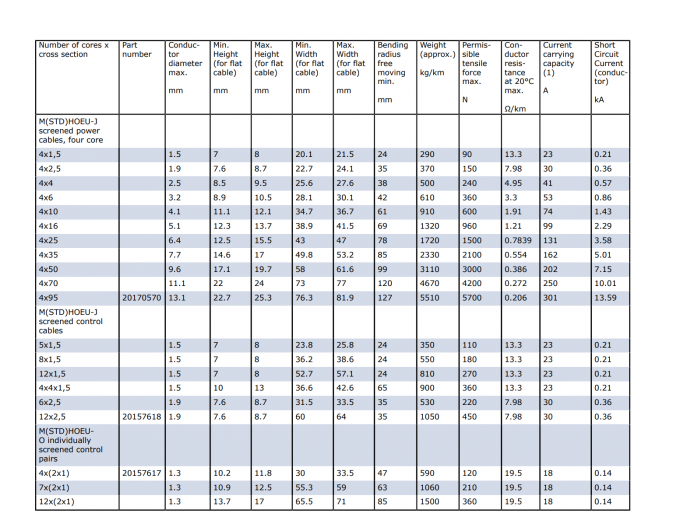

Application Scenarios
Port cranes and hoisting gears represent primary applications for the Type M(StD)HOEU cable in Australian industrial settings. Major ports like Brisbane, Sydney, and Melbourne rely on container cranes that operate continuously in harsh marine environments. The cable's resistance to salt spray, chemicals, and temperature extremes makes it ideal for these demanding applications.
Conveyor and transport systems throughout Australian mining and manufacturing facilities benefit from the cable's high flexibility and chemical resistance. Iron ore processing facilities, coal handling systems, and automated warehouses all require reliable power transmission to moving equipment, where cable failure can result in significant production losses.
Machine tools and automated production lines increasingly rely on flexible power solutions that can withstand continuous movement while maintaining signal integrity. The Type M(StD)HOEU cable's flat profile and superior flexibility make it perfect for applications ranging from CNC machine tools to robotic assembly systems.
The UL Style 4540 festoon cable for transport systems certification makes it particularly suitable for automated guided vehicle (AGV) systems, overhead crane applications, and material handling equipment where reliability is paramount. Australian manufacturers are increasingly adopting these automated systems, creating growing demand for high-performance festoon cables.
Advantages & Cost Efficiency
The extended service life of the Type M(StD)HOEU cable translates directly into significant cost savings for Australian operators. While the initial investment may be higher than standard cables, the reduced maintenance requirements and longer replacement intervals provide substantial total cost of ownership advantages.
Modern Chinese manufacturing capabilities have made this high-quality cable more accessible to Australian operators, offering competitive pricing without compromising on performance or reliability. The manufacturing efficiency gained through advanced production techniques and quality control systems ensures consistent product quality at attractive price points.
Customisation options available through specialised suppliers allow Australian operators to specify exact configurations for their unique applications. Whether you need specific conductor arrangements, modified temperature ratings, or custom sheath colours for identification purposes, the cable can be tailored to meet specific operational requirements.
Technical support services, including application engineering and installation guidance, add significant value for Australian operators. Local technical support ensures that installation and maintenance activities are performed correctly, maximising cable performance and service life.
Frequently Asked Questions
Q: Does this cable meet Australian electrical installation standards?
A: Yes, the Type M(StD)HOEU cable complies with AS/NZS 3191 standards in addition to DIN VDE 0250-809 and UL Style 4540 certifications. This triple certification ensures compliance with Australian electrical installation requirements, making it suitable for use in Australian industrial facilities without additional regulatory concerns.
Q: Can this cable be used in food processing facilities?
A: Yes, the 3GI3 rubber insulation provides excellent resistance to oils and fats commonly found in food processing, while the chemical-resistant outer sheath can withstand cleaning chemicals and sanitisers used in food industry applications.
Q: What's the difference between fixed and flexible installation temperature ratings?
A: Fixed installations can operate from -40°C to +80°C because there's no mechanical stress from movement. Flexible applications are rated from -30°C to +80°C as the combination of cold temperatures and mechanical flexing can affect cable performance.
Q: How does the flat profile benefit festoon system design?
A: The flat profile reduces overall system height, improves heat dissipation, and allows for more compact installations. This is particularly valuable in facilities with limited headroom or where space optimisation is crucial.
Q: What maintenance is required for this cable?
A: Regular visual inspection for damage, checking connections for tightness, and monitoring for signs of wear at support points. The cable's robust construction minimises maintenance requirements compared to standard industrial cables.
Conclusion & Next Steps
Selecting the right festoon cable for your Australian operation requires careful consideration of environmental conditions, mechanical requirements, and long-term cost implications. The Type M(StD)HOEU flat festoon cable represents a premium solution that addresses the specific challenges faced by Australian industrial operators.
The combination of German engineering standards, robust material selection, and proven performance characteristics makes this cable an excellent choice for critical applications where reliability cannot be compromised. Whether you're upgrading existing systems or designing new installations, the Type M(StD)HOEU cable provides the performance and durability that Australian industry demands.
For detailed specifications, pricing information, and technical support, contact FeiChun™ to discuss your specific requirements. Their technical team can provide application engineering support, custom configurations, and samples for evaluation. With local support and competitive pricing, implementing this high-performance cable solution has never been more accessible for Australian operators.
Don't let cable failure compromise your operational efficiency. Contact FeiChun™ today to learn how the Type M(StD)HOEU flat festoon cable can improve your system reliability and reduce total cost of ownership.
How to Reach Us
Get in Touch
SiteMap
Product Catalogue
Reeling Cable
Festoon Cable
Shore Power Cable




Scan to add us on WeChat
